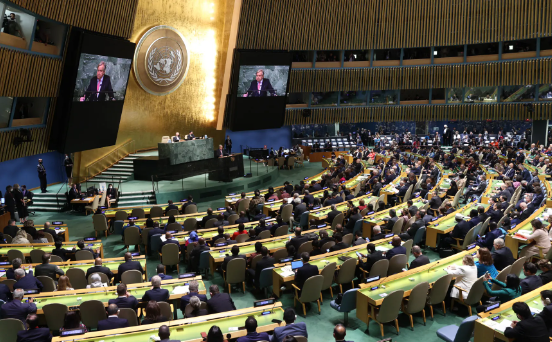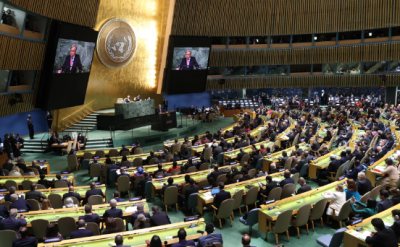World leaders will meet at the United Nations next week amid geopolitical tensions significantly fueled by the war in Ukraine, with Russia and China competing against the United States and Europe for the support of developing nations. Ukraine's war will once again be a focus at the annual gathering in New York, which will be attended in person for the first time since the conflict began by Ukrainian President Volodymyr Zelensky. This year's agenda is also dominated by concerns from the southern hemisphere. This attention reflects a growing interest from Western countries in developing nations to secure their support in efforts to isolate Russia.
Discussions during several high-level meetings at the General Assembly will center on the priorities of developing countries in Africa, Latin America, and Asia, including climate issues, health, development financing, and how to get the "Sustainable Development Goals" back on track. Richard Gowan, director of the International Crisis Group at the United Nations, stated, "This is the year that Southern Hemisphere countries have set the agenda." He added, "Non-Western countries have seized this moment very effectively," believing that they recognize the desire of both the United States and Russia to win their favor.
The war in Ukraine is just one reason for the focus on developing nations. Over the past decade, China has invested hundreds of billions of dollars in urgent infrastructure projects as part of its Belt and Road Initiative, which has faced criticism for burdening many countries with massive debts. The United States and its allies have recently begun efforts to counter China's growing influence by pledging funds in the form of development and climate aid.
Ahead of the New York meetings, diplomats acknowledged their focus on developing nations but denied any implications that competition plays a role in this. U.S. Ambassador to the United Nations Linda Thomas-Greenfield described the General Assembly gathering as an opportunity for small nations "to showcase their priorities to us," stating that it is not viewed as "a competition between great powers."
Chinese Ambassador to the United Nations Zhang Jun told Reuters that Beijing "has no intention to compete with others," adding that as conditions improve, China is "ready to do more for developing countries, but we are not competing." Russian Ambassador to the United Nations Vasily Nebenzya also reaffirmed to Reuters that Moscow "is not trying to win anyone over," stating, "We are what we are and we will not make our friendship with anyone conditional on them standing with us and doing what we want, unlike some of our colleagues here who twist arms."
Zelensky is expected to deliver a speech at the General Assembly next Tuesday and speak at a United Nations Security Council meeting on Wednesday, where he may sit at the same table as Russian Foreign Minister Sergey Lavrov. Nebenzya anticipated that the planned council meeting would be "a grand showcase." A senior European diplomat, who requested anonymity, warned that geopolitical tensions might deter more developing nations from aligning with Western-led efforts and push them towards the BRICS group in hopes of "better meeting some of the interests of developing countries." The BRICS group consists of Brazil, Russia, India, China, and South Africa.
An African diplomat, who also requested anonymity, commented that the United Nations is unable to "show African youth that their yearning for job opportunities can be resolved through democracy, not soldiers." He added, "If no one stands with them, BRICS, with whatever it offers, will be appealing."




